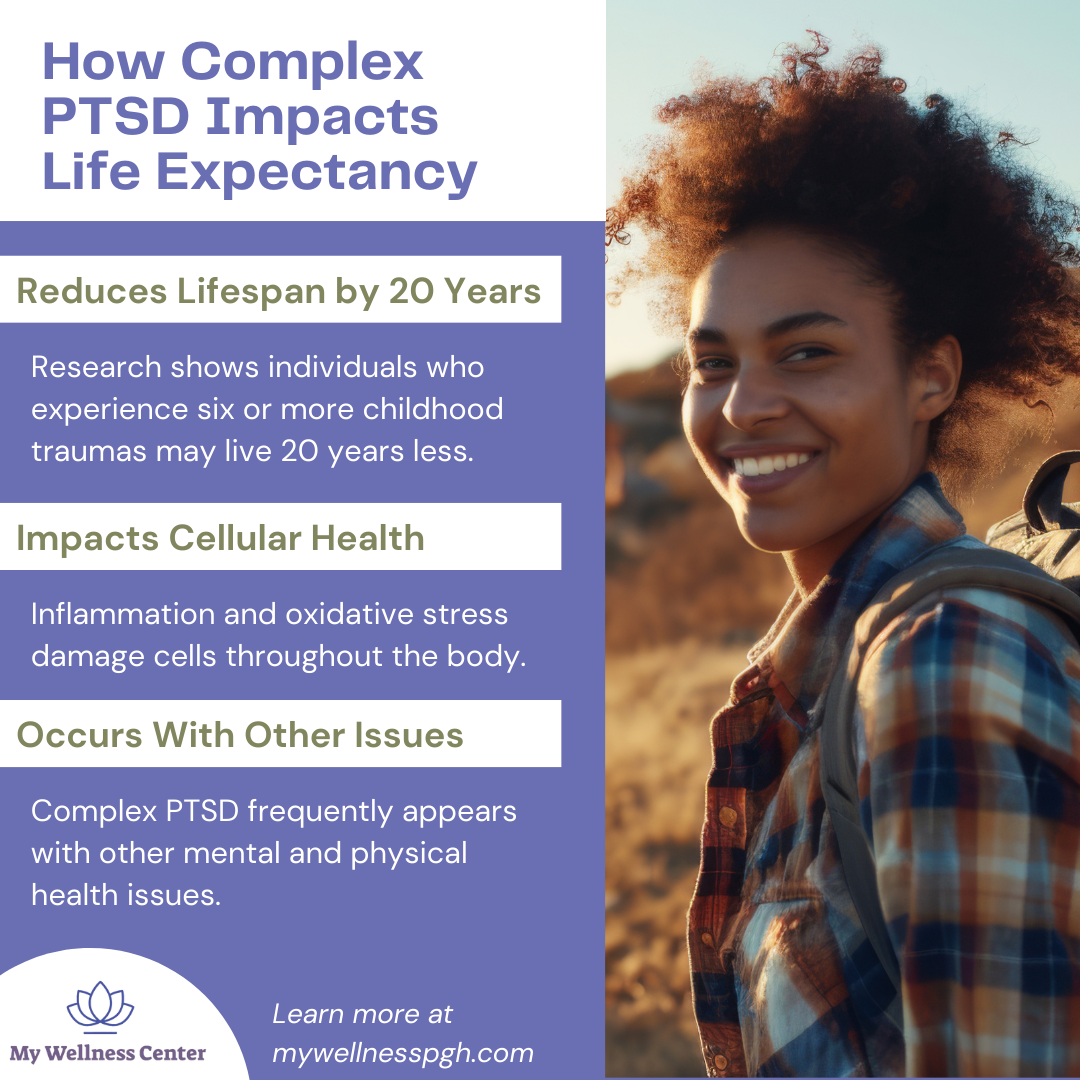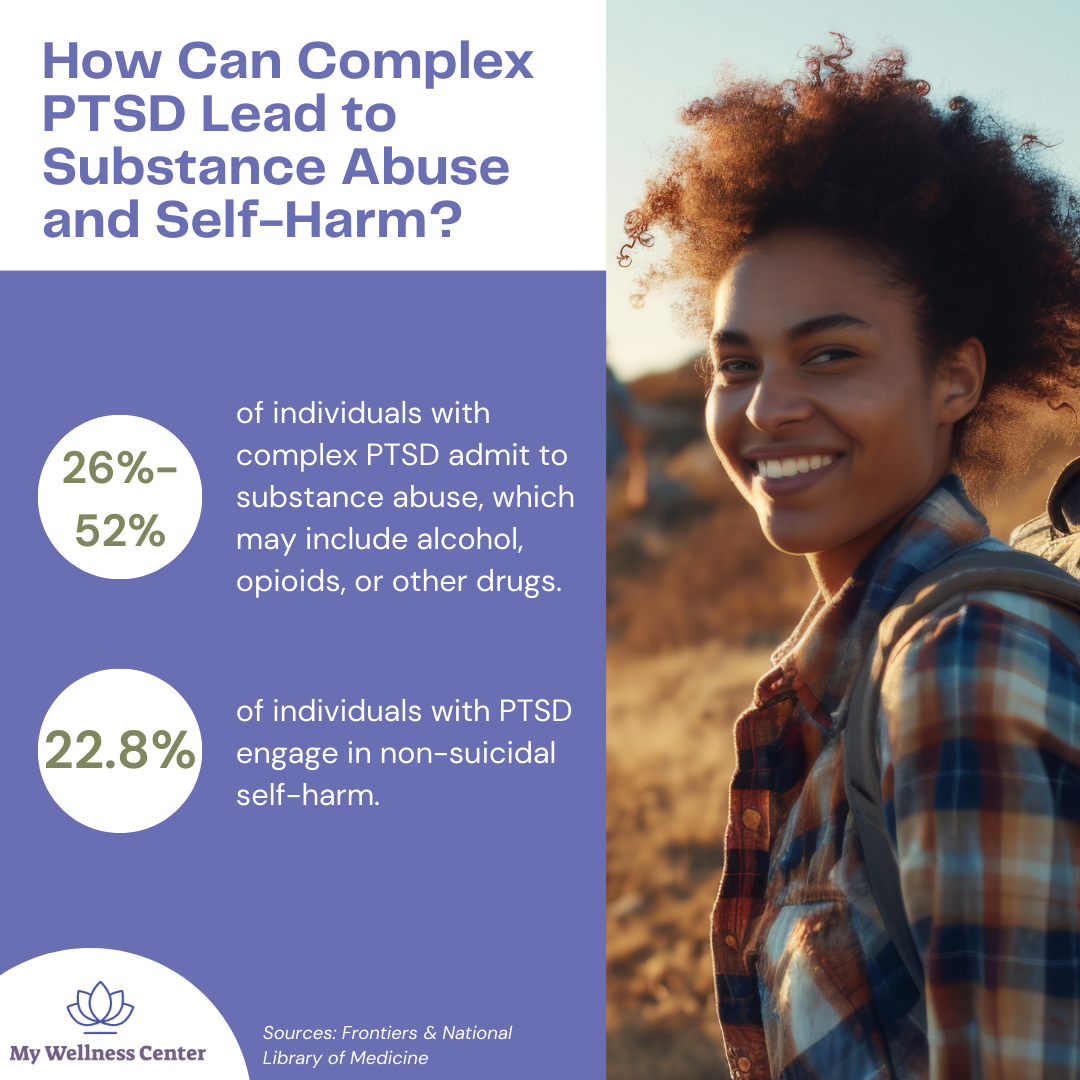PTSD is a serious mental health issue. If you think you’re at risk of hurting yourself or attempting suicide, call 911 or the suicide lifeline at 988.
When patients visit our office for assistance with complex post-traumatic stress disorder (C-PTSD), they’re often looking for mental peace.
Complex PTSD is a debilitating mental disorder that can dramatically impact the mind and emotional regulation, and weeks, months, and years of therapy are often required to help a patient push through their trauma.
What many people don’t realize: C-PTSD can also impact your physical health.
In fact, it can even shorten your life expectancy.
Read our full blog to learn more, or use the table of contents to skip to the section most relevant to you:
Table of Contents
What Is Complex PTSD?
How Complex PTSD Impacts Everyday Health
How Complex PTSD Impacts Life Expectancy
Treatment for Complex PTSD
Find Support for PTSD With A Pittsburgh Therapist
What Is Complex PTSD?
Also called “chronic PTSD,” complex PTSD is a mental health condition resulting from prolonged or repeated exposure to traumatic events, often occurring in situations where escape is difficult or impossible, and it’s often characterized by:
- emotional dysregulation
- negative self-perception
- relationship difficulties
- dissociation
- depression
- hypervigilance
- reexperiencing trauma
Complex PTSD is most common among individuals who have experienced ongoing trauma, such as childhood abuse, domestic violence, human trafficking, or combat experience. Although acute PTSD and chronic PTSD are similar, they have important differences—especially when it comes to physical health.
How Complex PTSD Impacts Everyday Health
Although a complex PTSD diagnosis isn’t a death sentence, it can negatively impact someone’s mental and physical health—factors that may contribute to a shorter lifespan.
Patients with complex PTSD frequently experience:
- Sleep Issues – These patients often report insomnia, nightmares, and trouble falling asleep. Lack of sleep is linked to a variety of health issues, including heart disease, kidney disease, high blood pressure, diabetes, obesity, hormone imbalances, and other ailments.
- Stress and Anxiety – Stress and anxiety often create unwanted physical responses like heart issues, breathing issues, weakened immune system, stomach issues, skin issues, and more.
- Chronic Pain – Believe it or not, complex PTSD can lead to chronic pain through inflammation, nervous system dysregulation, heightened stress response, and other factors.
- Unhealthy Coping Mechanisms – Individuals suffering from complex PTSD are more likely to engage in drug and alcohol abuse and self-harm.
- Weakened Immune System – The psychological and physical impact of complex PTSD can weaken an individual’s immune system, making them more susceptible to disease.
These are good reminders of why therapy is so important: Although medication can help mask many of the symptoms of PTSD, only therapy can get to the root of the problem and help a patient process the traumatic experiences that negatively impact their thought processes today.

How Complex PTSD Impacts Life Expectancy
Left unchecked, the body’s physical response to complex PTSD can gradually shorten an individual’s lifespan. Here’s how chronic PTSD impacts life expectancy over time:
1. Complex PTSD Can Reduce Lifespan By 20 Years
Research in the American Journal of Preventive Medicine shows individuals who experience six or more childhood traumas live 20 years less than individuals with five or fewer childhood traumas.
Surprisingly, over the 10-year study, researchers also found participants with a higher number of childhood traumas were 54% more likely to pass away during the study!
Of course, undergoing effective therapy treatments can offset or reverse these numbers.
2. Complex PTSD Can Impact Health On A Cellular Level
Another study found trauma, PTSD, and past PTSD are all associated with accelerated aging and a shorter lifespan—and they even found increased cell death in brain regions related to post-traumatic stress disorder.
As the researchers explain, this cellular aging is caused by inflammation and oxidative stress, and if left unchecked, these factors can contribute to numerous additional health issues.
3. Complex PTSD Frequently Occurs With Other Mental And Physical Health Issues
Patients with C-PTSD often manage other mental health issues as well—and each of these could contribute to additional physical ailments.
Those mental health issues include:
- Dissociative Disorders: These may lead to chronic pain, sleep disturbances, cardiovascular issues, and neurological symptoms (like seizures and dizziness).
- Depression: This can contribute to chronic pain, digestive issues, fatigue, heart disease, and immune issues.
- Borderline Personality Disorder: BPD can cause chronic pain, sleep issues, and digestive issues.
- Anxiety Disorder: Anxiety can lead to cardiovascular issues, gastrointestinal issues, and even respiratory issues.
Left unchecked, these physical issues can compound and lead to significant long-term health issues that can become fatal.
4. Complex PTSD Can Lead to Substance Abuse And Self-Harm
Individuals with PTSD may turn to substance abuse and self-harm as coping mechanisms for their trauma. Research shows:
- 26%-52% of individuals with complex PTSD admit to substance abuse, which may include alcohol, opioids, or other drugs, according to the National Library of Medicine.
- 22.8% of individuals with PTSD engage in non-suicidal self-harm. Although this study was limited to 241 college-level students with PTSD, it indicates the potential for self-harm in populations with C-PTSD.
Although substance abuse may lead to temporary relief, it can quickly turn into a crippling addiction. Self-harm, meanwhile, may lead to a temporary sense of control or relief, but it can quickly become life-threatening.

Treatment for Complex PTSD
Fortunately, with the right treatment for complex PTSD, many of its harmful health consequences can be reversed or eliminated. You and your therapist may explore a combination of treatment strategies, including:
- Cognitive Processing Therapy (CPT): CPT helps individuals reframe negative thoughts about trauma to reduce emotional pain and improve mental health.
- EMDR: EMDR assists in reprocessing traumatic memories, significantly reducing their emotional impact.
- Group Therapy: Sharing experiences in group therapy provides support, reduces isolation, and helps individuals learn coping strategies.
- Mindfulness and Stress Reduction Techniques: Practices like meditation, yoga, and deep breathing exercises help manage stress and improve emotional regulation.
- Lifestyle Changes: Healthy habits such as regular exercise, a balanced diet, and sufficient sleep positively impact mental health and resilience.
- Support Systems: A strong support system of family, friends, and professionals provides crucial encouragement and assistance in recovery.
- Medication: Antidepressants and anti-anxiety medications can alleviate symptoms of anxiety, depression, and insomnia associated with chronic PTSD.
Find Support for PTSD With A Pittsburgh Therapist
If you’re ready to manage your PTSD, contact us. Our team of Pittsburgh PTSD therapists is standing by to help you process your trauma and begin living life to the fullest.

